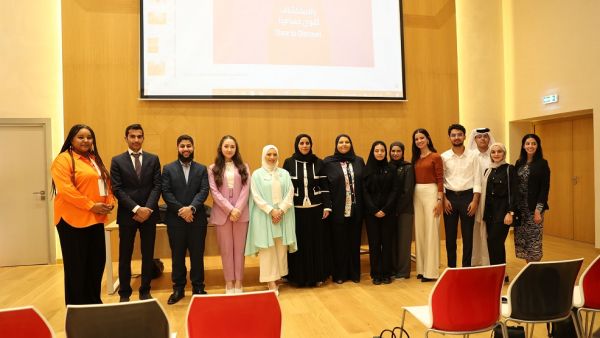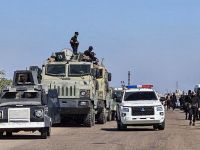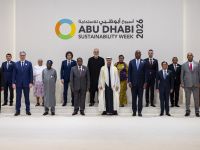TEDinarabic experts highlight arabic language’s adaptability

When Arabic speakers and educational activists from different Arab countries gathered in one place to share their views, ideas, skills, and experiences with a global audience through the groundbreaking TEDinArabic initiative, it reflected the Arabic language’s adaptability, its ability to excel in the fields of science, literature and poetry – and how Qatar Foundation is advancing it.
The third regional event held under TEDinArabic – created through a partnership between Qatar Foundation (QF) and TED to amplify ideas in the Arabic language – saw interactive workshops and discussions shed light on the richness of the Arabic language as one of the fundamental elements that unites Arab history, heritage and civilization, reflecting its characteristics that make it a vibrant and advanced language capable of keeping pace with the modern world.
"Qatar Foundation has always been a pioneer in international partnerships, and its collaboration with TED to launch TEDinArabic has provided Arab youth with an opportunity to tell stories about the success of researchers and experts in their various fields of work,” said Moza Khalid Al-Hajri of Georgetown University in Qatar, a QF partner university, who gave the keynote speech at the event hosted by Mohammed VI Polytechnic University in the Moroccan city of Ben Guerir.
"Young people believe in the importance of the Arabic language as a cornerstone of our identity, and that any change we want to make in the world must be based on a rooted identity.
“The conference enabled us as students and researchers from various Arab countries to discuss our thoughts and concerns about the Arabic language, and create fruitful social networks that will help us move forward with the next steps
Lebanese writer, poet, and Arabic language advocate Suzan Talhouk said: “The partnership that brings together Qatar Foundation and TED is of great importance because it builds bridges with young people and gives them hope to achieve the success they seek by sharing their ideas and experiences with Arabic speakers from around the world.”
Speaking about the perception that the Arabic language faces difficulty in keeping pace with progression in the science and digital fields, Talhouk said: "Encapsulating the role of language in one particular field is wrong, and refers to the cancel culture that some are accustomed to”, explaining that the Arabic language can shine in fields such as poetry, theater, literature and humanities.
"Why are we focusing only on the Arabic language’s necessity to keep up with sciences, while our language expresses infinite things?"
And focusing on the impact of Arabic dialects on the progression of the Arabic language, Talhouk said: "The perception of erasing dialects - if we want to develop the classical Arabic language - is inconsistent and not applicable. These dialects fall within the cultural heritage of each country, and our dialects can coexist with the classical language in the same way that literature and science coexist."
Dr. Charles Muhannad Malak, a Syrian researcher in molecular and cell biology and oncology, said, "The development that the Arabic language is witnessing in literature, humanities, and art is evidence that this language is also capable of achieving the same progress in the scientific field, which refutes the claim that the Arabic language is a ‘static language’."
And academic Hassan Radwan, Director of the School of Architecture, Planning & Design atMohammed VI Polytechnic University, said mastering the Arabic language is one of the major pillars of students' excellence, keeping them aware of their cultural heritage. “Investing in scientific research in the Arab world and internationally is among the most important foundations for success of the Arab universities,” he said.
“Despite the array of languages used, the orientation of Moroccan universities is deep in Arab and African civilization and identity that is open to other civilizations and cultures, whether local or regional.”
Mohammed Al-Janahi, a professional learning designer at QF’s Education Development Institute, described TEDinArabic as a pioneering initiative that “allows Arab minds a space to spread their ideas and contribute to cultural and scientific movement internationally”.
A workshop he led at the third regional TEDinArabic event shed light on the emergence of grammar rules and the schools of Arabic poetry, focusing on simplifying these rules for attendees to instill in them a love of this type of literature. "I was amazed at the interaction of the attendees and the ability of a number of them to write verses of poetry at the end of the workshop," he said.
“The audience was the real star of this literary event, and despite the fact our local dialects differ greatly, classical Arabic brought our hearts and tongues together."
Mohammad Salman Ali, Debate Instructor at QF’s QatarDebate, supervised a workshop on persuasion and influence skills, which aimed to familiarize students with basic presentation skills and tools for capturing audiences’ attention, especially in critical discussions. Meanwhile, a session moderated by Fatima El-Mahdi, head of THIMUN Qatar – an initiative under QF’s Pre-University Education that sees young people simulate United Nations committees – revolved around the importance of citizens of Arab countries exploring themselves and those in neighboring countries, telling their stories, and sharing their heritage through music, art, and poetry.
El-Mahdi said that information about Arab countries available through internet search engines often lacks accuracy, adding: "If TEDinArabic tells inspiring stories about education and about technology, then Qatar Foundation is educating people while, at the same time, engaging in pioneering technology projects on the ground.”
Students sponsored by Qatar Museums who attended the event explained that Qatar is making significant efforts to preserve the Arabic language from an academic, educational, and research perspective. They said TEDinArabic has allowed them to learn about cultures and students from other brotherly countries, and that what unites them is the passion for the Arabic language and ways to advance it.
The Morocco event is the third of a series of regional TEDinArabic events that precede the main event to be held in Doha, Qatar, in March 2023, which will include 16 male and female speakers from the Arabic-speaking world, who will be selected through the ‘Share your ideas with TEDinArabic’ platform. Ideas can be submitted until 31 October 2022 at tedinarabic.ted.com/ideasearch/en/
Background Information
Qatar Foundation
Qatar Foundation (QF) is a non-profit organization made up of more than 50 entities working in education, research, and community development.
Our unique ecosystem—supported by partnerships with leading international institutions—is built on initiatives that address our most pressing challenges, create global opportunities, and empower people to shape our present and future.







